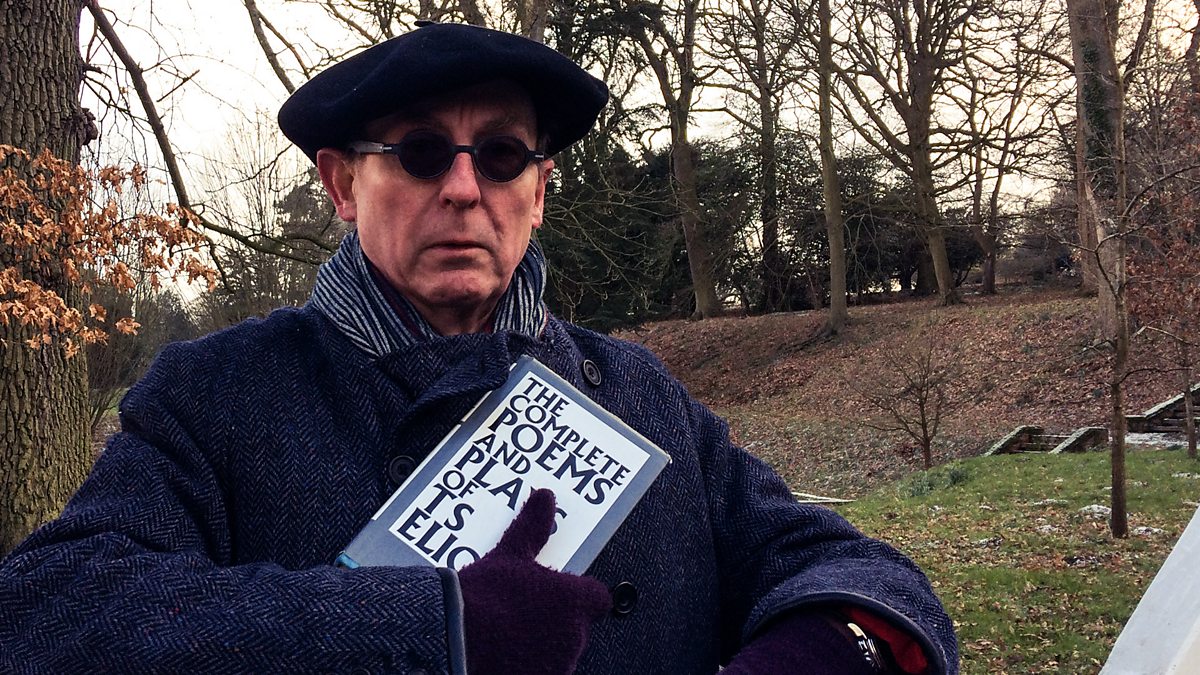Well, it was one of those coincidences. I happened to drive through East Coker yesterday, only to discover that the above programme was on BBC4 in the evening. It was refreshing that A.N. Wilson somehow managed to present it without all the usual BBC flummery (I'm Professor this and I'm heading there and I'm discovering that, etc. etc.) I found it both enjoyable, poignant informative and a bit shocking....even if the Radio Times (p.73) damned it in advance, and even damned the background music which was much more appropriate than the usual apreggiated marimba mush that we get with almost everything.
Return to T.S. Eliotland
Collapse
X
-
.
... this was just marvellous - and had the best of all results in that it had us scurrying back to the texts to re-read our fave bits.
Beautiful photography in its own right.
AN Wilson excellent - his handling of TS Eliot's antisemitism was exemplary : you could feel his (AN Wilson's) real pain and perplexity.
And I loved his greatcoat. And the specs...
.
Comment
-
-
I’m not a great television watcher so would have missed this without it being highlighted via this thread. So, thanks everyone for an hour well spent on an intelligent, compelling and in its way moving film. It brought back vividly that first reading of Prufrock. Like nothing else one had read - and no poetry would ever quite seem the same again. And a joy to watch without what Ardcarp describes so accurately as, “flummery”.
Comment
-
-
I also enjoyed Eliotland. Following on from his previous excursions to Larkinland and Betjemanland, it was always going to be worth watching. Which poet's land will he go to next?
I do not sit down and read poetry as often as I might like to and it was especially rewarding and insightful to sit and listen Stephen Dillane's utterly compelling staged rendition at the Donmar in 2009. A stunning performance (and achievement) which I will never forget, delivered from memory without a text in front of him. The second half was a performance of Beethoven’s Quartet Opus 132, with the players sitting under the gentle glow of a single lamp above their head. We were equally impressed the next year by Fiona Shaw's performance of The Wasteland, also from memory, in the fitting setting of the still semi-derelict Wilton's Music Hall.
Comment
-
-
Just one niggle - ANW claimed that amongst the younger poets TSE encouraged was Dylan Thomas. I don't think that this was the case: Faber certainly didn't publish Thomas' poetry, and the only reference from TSE himself that I can find is in a letter of 1942, replying to Robert Waller (who had mentioned Thomas) in which he says "I am certainly not altogether happy about all this Welsh poetry"!
Eliot seems - in this letter - to be less than enthusiastic about his contemporaries generally:
It is not a simple question of my “liking” or not one poet’s work or another’s, and recommending it to my firm on that ground. I doubt whether I get very much pleasure from any modern poetry, either by my contemporaries or by my juniors. That does not imply a comparative rating in which I put my own work very high. It is simply that if one writes oneself, interest in poetry is largely a matter of what can be of use to oneself, and I do not believe that living poets can be of much use to each other. Or rather, I believe that they cannot gain very much by study of each other’s work.
...
I have had misgivings, in one direction or another, about everybody and about every tendency in the last twenty years ...
My own influence, as far as I have had any, has been purely negative – in helping to put one kind of poetical jargon out of date[FONT=Comic Sans MS][I][B]Numquam Satis![/B][/I][/FONT]
Comment
-
-
I'm probably alone in thinking that Eliot came very close to becoming a Buddhist at various points in his life. The references to images that he has "stored up against my ruin" show a closeness that make one pine: one step further, etce etc. He seems to have felt obligated to encompass all the baggage of Western culture before availing himself of its transcendence. Then there is the appreciation of silence he found in places of communal worship, unfortunately the Christian nearest to Buddhist centreing, found in common in ritual as something important in itself, but not pointing beyond, as Christianity, like all religions, would have it. Belief must be: you can't believe in nothing! Being a man of (attached to) words, Eliot would always cling to the description rather than experiencing the totality of the described as autonomous of conceptualisation that is the essence of Buddhism as I understand it. Some chords don't want (or need) resolving, as Charles Ives put it! It boils down to a question of not mistaking the map for the journey. Had Eliot had access to today's knowledge, and understood ecology, who knows how much greater his influence might have been on 60s culture! He and Wittgenstein should have got together, at the point Ludwig finished his own "Tractatus", perhaps!
Comment
-



 I probably half-inched it from some source not my own...
I probably half-inched it from some source not my own... 
Comment